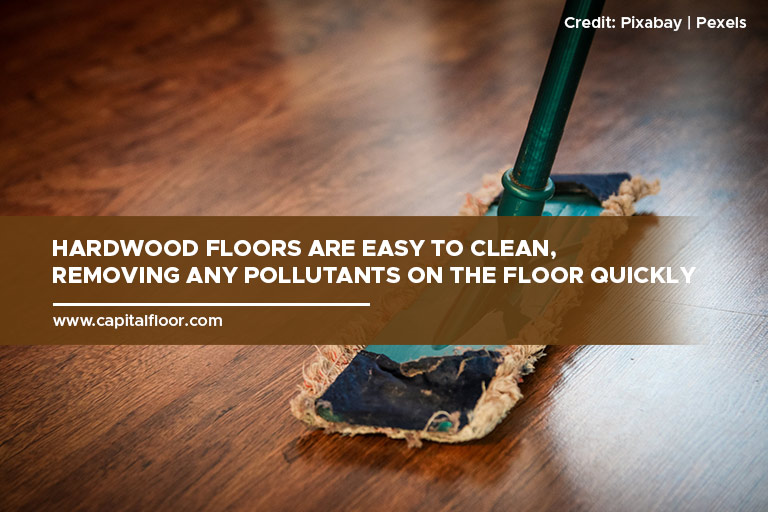Our showroom is open to the public. Please click HERE for more details.
Our showroom is open to the public. Please click HERE for more details.
When you think about it, the advantages of hardwood flooring are astounding. What other flooring option never goes out of style, lasts for generations, complements every décor, and is so simple to maintain? However, what you may not know is that wooden floors have significant health benefits. Wood flooring impacts indoor air quality directly. Wooden floors can considerably enhance indoor air quality in comparison to other flooring materials.
We must be selective about the home furnishings and materials we use since we spend most of our time indoors. Installing hardwood flooring has been found to significantly enhance our indoor environments. But what causes low indoor air quality?

Exposure to poor indoor air quality has several harmful health effects on our bodies.
Dust, pollen, pet dander, mildew, fungal spores, dust mites and other substances that congregate and accumulate in our homes can trigger allergic reactions.
Humid environments can cause indoor air contaminants to linger and promote the growth of mildew and bacteria.
These chemicals become airborne when at room temperature. Many VOCs can have harmful effects on our health and can be found in many common cleaning products, solvents, glues, paints, and more.
What occurs outside of our residence can also have a significant impact on its interior environment. Local industry, pesticides, road traffic, and numerous other events that occur in both rural and urban settings can hurt the purity of the air inside your home.

Hardwood flooring has several benefits to indoor air quality. This includes:
Wood flooring is the most effective form of flooring to resist the accumulation of allergens. Wood floors are also easy to clean, and contaminants on the floor are readily removed each time they are cleaned.
In contrast to other flooring options, hardwood floors do not absorb outside pollutants. Outside pollutants, such as pesticides and other hazardous substances, are frequently tracked into our residences. Wood floors do not tend to accumulate these toxins, nor does strolling on them discharge them into the air
Hardwood flooring can be moisture-resistant, and as long as you clean spills immediately, your floors will not trap water. This eliminates the presence of mould that can be harmful to you and your family.
Certain varieties of flooring, such as carpets, serve as allergen breeding grounds. In carpet fibres, small microorganisms, pollen, grit, dust mites, mould, and animal allergens tend to accumulate. Other forms of flooring, such as genuine wood, tend to reduce allergen accumulation because there are no fibres to trap allergens.
In a broader sense, installing wood flooring is healthier for the environment, particularly if it is prepared and sealed with non-VOC substances. Wood flooring has a lesser carbon footprint than synthetic flooring. This indicates that wood flooring can effectively reduce the concentration of greenhouse gases in both indoor and outdoor air.
Is varnish sustainable? No, generally speaking. Varnish relies on caustic solvents that are frequently rich in volatile organic compounds. In addition to being messy and challenging to use, any spills must be cleared up promptly.
Eco-friendly wood coatings are free of volatile organic compounds and other dangerous chemicals and offer a safe, environmentally friendly alternative to noxious products and chemicals that require energy-intensive processing.
They are also more resilient and durable than conventional wood finishes. They interact with the organic compounds in the wood they are used to treat because they are natural. As a result, these finishes do not require reapplication as frequently and do not degrade as rapidly as varnishes or non-natural finishes.
These water-resistant luxury vinyl tile surfaces are incredibly simple to maintain. Therefore, there is no cause for concern regarding the impact of confined pollutants on indoor air quality.
Engineered hardwood is a gorgeous and long-lasting material produced from fewer hardwood trees. Additionally, it has minimal VOC levels, particularly if you choose non-toxic, eco-friendly coatings or stains for your floors.
Linoleum is composed solely of biodegradable components, such as linseed oil, tree resin, and cork dust. This highly renewable material is also flame-resistant and moisture-resistant.
Options such as reclaimed hardwood, recycled glass, and polyethylene terephthalate (PET) carpet give recycled materials a new lease on life. In addition to keeping more waste out of landfills, the result gives your home an attractive and distinctive appearance. Reclaimed wood floors create the natural beauty of wood flooring without requiring the felling of new trees.
As we become more aware of health concerns in our residences, the size of our carbon footprints, and the impact of our lifestyle choices on the environment, it is essential that we make informed decisions. If you’re considering an upgrade to your flooring, substantial hardwoods are an excellent option with a long list of advantages. Capital Hardwood Flooring is pleased to offer eco-friendly, hardwood flooring options.
We offer the finest wood flooring in Toronto and provide professional services that ensure customer satisfaction and a stress-free experience. Simply give us a call at 416-536-2200 if you are searching for the most enduring wood flooring.